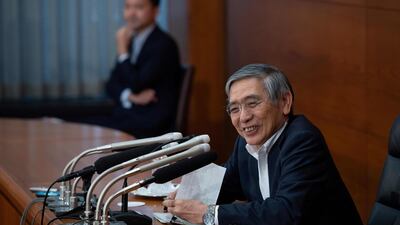The gap between the Bank of Japan and its global peers widened on Friday.
The BOJ maintained its aggressive asset-purchase and yield-curve targets less than 24 hours after the European Central Bank mapped out an exit from its crisis-era policies, and just days after the US Federal Reserve again raised interest rates.
Underscoring the divide, the BOJ downgraded its assessment of inflation while Governor Haruhiko Kuroda repeated his pledge to continue with stimulus until Japan reaches its 2 per cent inflation target.
"It’s appropriate for Japan to continue current powerful monetary easing persistently," Mr Kuroda told reporters. He cited an entrenched "deflationary mindset" that’s beset Japan for decades but "doesn’t exist in the US or Europe."
Economists, who were unanimous in forecasts for policy to remain unchanged, said there is little chance that the BOJ will consider an exit strategy in the near term. While Kuroda insisted that the longer-term price trend is positive, the BOJ said inflation is currently sitting in a range of 0.5 per cent to 1 per cent, weaker than around 1 percent earlier this year.
Kyohei Morita, chief Japan economist at Credit Agricole, said it’s "crystal clear" that the BOJ is headed in a different direction than its peers.
"What’s interesting is that there is not much call for the BOJ to add more stimulus," Mr Morita said. "The BOJ has done so much and it’s increasingly the view that the problem with Japan isn’t monetary policy but more economic structure and growth strategy." He added that with Kuroda now into his sixth year of aggressive stimulus, the limits of monetary policy are on show.
Mr Kuroda said Friday that a stronger yen and cheaper accommodation prices had weighed on inflation. Yet he said momentum is intact and that the BOJ’s current policy is sustainable.
JPMorgan and Bank of America Merrill Lynch are among those who in recent weeks have pushed back their expected timing of the BOJ’s first move toward policy normalisation. In a Bloomberg survey, 88per centt of analysts said it wouldn’t start until 2019 or later.
“Inflation has certainly been lower than would’ve been expected,” Federal Reserve Bank of St Louis President James Bullard said in Tokyo last month. “It’s been frustrating in Japan, but it’s also been instructive for the rest of the world to understand what kinds of things can happen if inflation expectations get rooted at a low level.”

